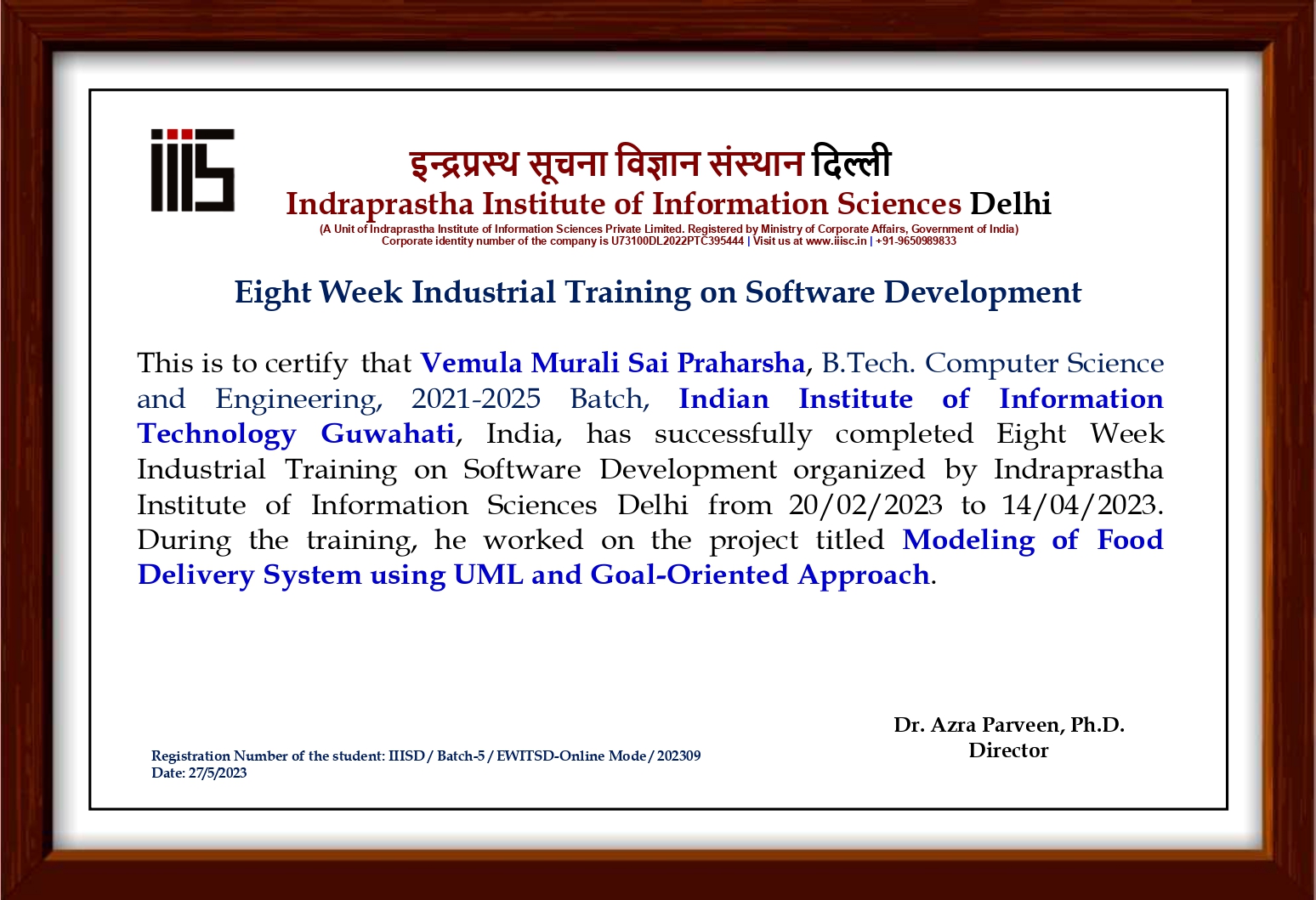


Mr. Nitin Chaudhary
Mr. Sandeep Singh is an expert in the area of Software Requirements Modeling and Web Development.He is working as instructor at IIIS Private Limited.

Mr. Syed Hammad Ali
Mr. Syed Hammad Ali is working as an instructor for Front-end and Back-end development at IIIS Private Limited. He is expert in the area of Software Requirements Elicitation and Analysis using Goal-Oriented approach.




✓ Understanding of various requirements engineering processes like requirements elicitation, requirements modeling, requirements verification and validation, and requirements management
✓ Develop critical thinking about different stages of software development and methods for the identification of software requirements.
✓ Application of UML and Goal-Oriented aproaches in software development
✓Learn basic fuzzy based multicriteria decsion making methods like AHP and TOPSIS, for the selection of software requirements during development process.
✓ Understanding the software cost estimation process
After the completion of the training program, all registered participants will receive a Certificate of Completion from IIIS Private Limited signed by the director(s) of IIIS Private Limited. Criteria for the completion of the training will be lecture attendance, discussion of project and final presenattion of the project in the presence of an external expert, who may be from academia or industry.

ITSD-101(T): Elements of Software Development
The objective of this course is to introduce the software development process to the students. At the end of this course, students will be able to understand the following:
Course Contents:
Introduction to Software and Program, Software development life cycle models: Waterfall model, Iterative model, Spiral model; Introduction to agile methods; Software requirements (SRs) elicitation techniques: Traditional methods, Package-oriented method, Goal-oriented methods (AND/OR graph); SRs Analysis using UML models: Class diagram, Use-case diagram, Activity diagram; Security requirements elicitation: Method for the identification of security and threats.Test Cases Writing: Black box and White box testing; Selection of programming languages according to the need of the requirements.
The objective of this course is to introduce the basic concepts of soft computing with main emphasis on fuzzy logic to the students. At the end of this course, students will be able to understand the following:
Course Contents:
Computing: Hard computing and Soft Computing, Different components of soft computing; Different sources of uncertainty: Randomness and vagueness; Fuzzy logic, Membership functions, main features of a fuzzy set membership functions, i.e., core, support, and boundary; Difference between crisp set and fuzzy set; Some numerical examples; Normal fuzzy set, subnormal fuzzy set, convex fuzzy set, etc.; types of fuzzy numbers. Operations on fuzzy sets: Cartesian product, Max-min composition on fuzzy relations; Types of fuzzy numbers: Triangular fuzzy number, Trapezoidal fuzzy number, Operations on fuzzy numbers, Methods for fuzzification and defuzzification; Multi-criteria decision making (MCDM) methods: Analytic Hierarchy Process (AHP), Technique for Order of Preference by Similarity to Ideal Solutions (TOPSIS).
ITSD-103(T): Java Programming
The objective of this course is to introduce the Java Programming to the students. At the end of this course, students will be able to understand the following:
Course Contents:
Java Features, Constant, Variables and Data Types, Scope of variable, Type casting, standard default values, Operator and Expression, Decision making and Looping: The While statement, the do statement, the for statement, Jumps in Loops, Labelled Loops. Classes, Object and Methods Defining a class, creating object, accessing class members, Constructor, Methods Overloading, Static Variables, Inheritance: Extending a Class and implementing interfaces, Overriding Methods, Final variable and Methods, Final Classes, Abstract method and Classes, Visibility Control, Array, Strings and Vectors, String, Wrapper Classes, Packages, Multi-Threading: Extending a thread class, Life cycle of thread, using thread method, Thread exceptions, Thread priority, Synchronization, implementing a ‘Runnable’ Interface, Managing Errors and Exceptions, Types of errors, Exception, Multiple catch statement, using finally statement.
The objective of this course is to understand the case study process by considering an information system. The students will select an information system and will identify the requirements for the analysis using UML models then they will apply the fuzzy based MCDM methods. At the end of this course, students will be able to understand the following:
Course Contents:
Modeling of SRs using star UML tool, Construction of an AND/OR graph for SRs; Elicitation of complete set of SRs; Analysis of the SRs using Use-Case and Misuse-Case diagrams; Detection of conflictions among requirements using preference matrix; Applications of fuzzy AHP and TOPSIS in real world.
The objective of this course is to implement the software requirements using some of the selected language like C/C++/HTML-CSS/PHP/Python, etc. At the end of this course, students will be able to understand the following:
The objective of this course is to write the programs using Java programming language.
| S. No. | Name of the Tranining Program | Duration | Registration Charges | Tution Fee | Total Amount |
|---|---|---|---|---|---|
| 1. | Internship / Industrial Training on Software Development (Online Mode) | 4-8 Weeks | INR 1,000/- | INR 1750/- | INR 2,750/- |
| 2. | Internship / Industrial Training on Artificial Intelligence (Online Mode) | 4-8 Weeks | INR 1,000/- | INR 3,500/- | INR 4,500/- |
| 3. | Short term Course on Software Development & Artificial Intelligence(Online Mode) | 3 Months | INR 1,000/- | INR 5,000/- | INR 6,000/- |
| 4. | Short term Course on Software Development (with PHP / Java) (Online Mode) | 3 Months | INR 1,000/- | INR 6,000/- | INR 7,000/- |
| S. No. | Name of the Tranining Program | Duration | Number of Participants | Total Amount |
|---|---|---|---|---|
| 1. | Internship / Industrial Training on Software Development (Online Mode) | 4-8 Weeks | 05 to 10 | INR 2,500/- per participant |
| 11 to 20 | INR 2,250/- per participant | |||
| 21 to 30 | INR 2,000/-per participant | |||
| Above 30 | INR 1,750/- per participant | |||
| 2. | Internship / Industrial Training on Artificial Intelligence (Online Mode) | 4-8 Weeks | 05 to 10 | INR 4,250/- per participan |
| 11 to 20 | INR 4,000/- per participant | |||
| 21 to 30 | INR 3,750/-per participant | |||
| Above 30 | INR 3,500/- per participant |
 info@iiisc.in or
info@iiisc.in or  +91-9650989833
+91-9650989833